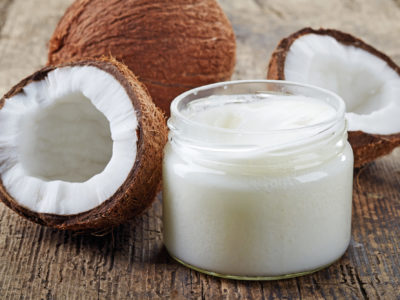Looking for the best quality coconut oil?
Coconut oil is yet another one of those Paleo staples that is everywhere! And that’s not without reason: it’s a great anti-inflammatory cooking fat. Coconut oil is made from the kernel or meat of coconuts, species Cocos nucifera. With its mild coconut-y flavor, it’s no wonder that coconut oil is featured in so many Paleo recipes, including my own and in frequent guest recipes!
Because of its unusually high saturated fat content, coconut oil has a high smoke point (the temperature at which the fat is damaged and begins to smoke) and is mostly solidified at room temperature (its melting point is about 74F). Likewise, coconut oil stays fresh without rancidifying for quite some time, as the saturated fat content is less likely to spoil.
Coconut oil is 48% lauric acid, a 12-carbon saturated fatty acid that falls into the category of a medium chain triglyceride (MCT). You’ve probably heard about the benefits of MCTs before; the reason that they are touted as a miracle energy source is because they don’t require bile salts to be absorbed in the small intestine (being passively absorbed, they enter the bloodstream very quickly, and can even be easily digested by people without a gallbladder). MCTs are rapidly converted into ketone bodies by the liver. Ketone bodies are water-soluble molecules normally produced as intermediates or by-products when the body mobilizes (accesses) fat stores. Ketone bodies (at least two of the three types) can be readily used as fuel by every cell and are the brain’s preferred fuel source in the absence of glucose or in the presence of insulin resistance (which is why supplementing with MCT oil has been shown to be so beneficial in neurodegenerative disorders such as Alzheimer’s disease).
Coconut oil also has diverse antimicrobial properties. Dietary MCTs have been shown to radically reduce the production of a variety of proinflammatory cytokines (meaning they reduce inflammation), increase activity of the histamine-clearing enzyme diamine oxidase (great for histamine intolerance and allergy), increase mucus production (great for gut barrier health), and support gut-barrier healing (by increasing cell-turnover rate in the gut). However, MCTs can also increase the secretion of IgA antibodies in the gut (specifically in the Peyer’s patches), which may be problematic for some people, despite all the other benefits. If you have any reaction to coconut or palm oil, switch to other healthy fats for your cooking.
It’s really important to get your coconut oil from a responsible source, as the coconut industry is wreaking havoc on countries with high production rates. Make sure to get organic, extra virgin coconut oil from a good company that is using sustainable practices.
Looking for other high quality coconut products?


 Plantain
Plantain